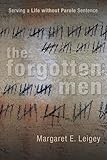The Forgotten Men : Serving a Life without Parole Sentence / Margaret E. Leigey.
Material type: TextSeries: Critical Issues in Crime and SocietyPublisher: New Brunswick, NJ : Rutgers University Press, [2015]Copyright date: ©2015Description: 1 online resource (242 p.) : 3 tablesContent type:
TextSeries: Critical Issues in Crime and SocietyPublisher: New Brunswick, NJ : Rutgers University Press, [2015]Copyright date: ©2015Description: 1 online resource (242 p.) : 3 tablesContent type: - 9780813569482
- 9780813569499
- 365/.60973 23
- HV9304 .L395 2015
- online - DeGruyter
- Issued also in print.
| Item type | Current library | Call number | URL | Status | Notes | Barcode | |
|---|---|---|---|---|---|---|---|
 eBook
eBook
|
Biblioteca "Angelicum" Pont. Univ. S.Tommaso d'Aquino Nuvola online | online - DeGruyter (Browse shelf(Opens below)) | Online access | Not for loan (Accesso limitato) | Accesso per gli utenti autorizzati / Access for authorized users | (dgr)9780813569499 |
Frontmatter -- Contents -- Preface: Death by Incarceration -- Acknowledgments -- 1. The Rise in the Permanently Incarcerated -- 2. The Forgotten -- 3. The Pains of Permanent Imprisonment -- 4. Coping with Permanent Incarceration -- 5. Growing Old in Prison -- 6. Forgotten No More -- Appendix A: Pseudonyms and Demographics of Respondents -- Appendix B: Researching the Forgotten -- Notes -- References -- Cases -- Index -- About the Author
restricted access online access with authorization star
http://purl.org/coar/access_right/c_16ec
Today there are approximately fifty thousand prisoners in American prisons serving life without parole, having been found guilty of crimes ranging from murder and rape to burglary, carjacking, and drug offences. In The Forgotten Men, criminologist Margaret E. Leigey provides an insightful account of a group of aging inmates imprisoned for at least twenty years, with virtually no chance of release. These men make up one of the most marginalized segments of the contemporary U.S. prison population. Considered too dangerous for rehabilitation, ignored by prison administrators, and overlooked by courts disinclined to review such sentences, these prisoners grow increasingly cut off from family and the outside world. Drawing on in-depth interviews with twenty-five such prisoners, Leigey gives voice to these extremely marginalized inmates and offers a look at how they struggle to cope. She reveals, for instance, that the men believe that permanent incarceration is as inhumane as capital punishment, calling life without parole "the hard death penalty." Indeed, after serving two decades in prison, some wished that they had received the death penalty instead. Leigey also recounts the ways in which the prisoners attempt to construct meaningful lives inside the bleak environment where they will almost certainly live out their lives. Every state in the union (except Alaska) has the life-without-parole sentencing option, despite its controversial nature and its staggering cost to the taxpayer. The Forgotten Men provides a much-needed analysis of the policies behind life-without-parole sentencing, arguing that such sentences are overused and lead to serious financial and ethical dilemmas.
Issued also in print.
Mode of access: Internet via World Wide Web.
In English.
Description based on online resource; title from PDF title page (publisher's Web site, viewed 30. Aug 2021)


